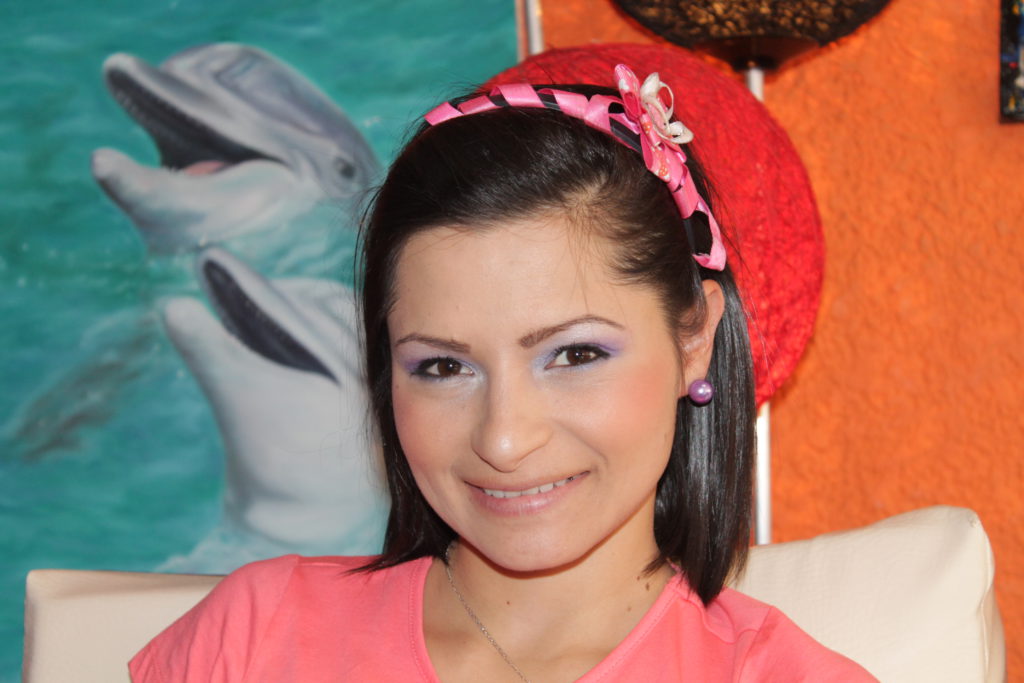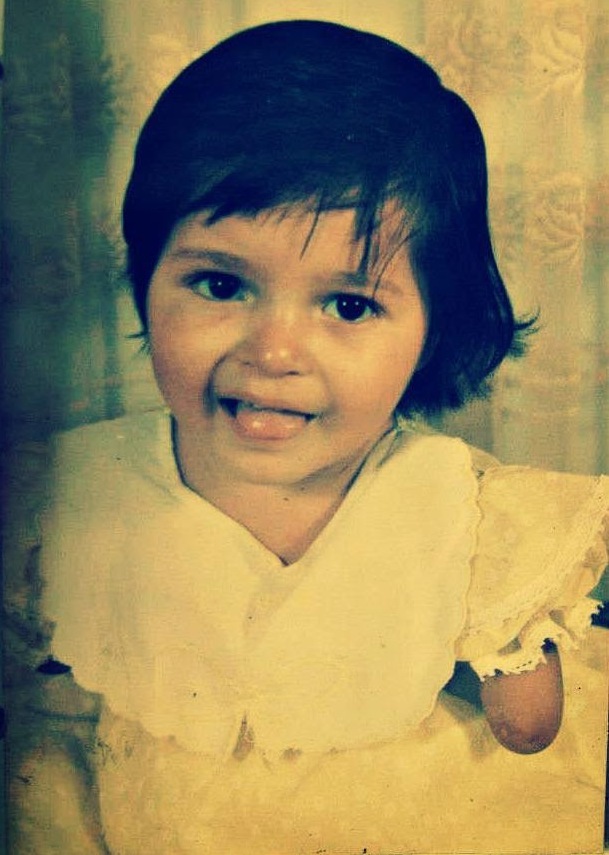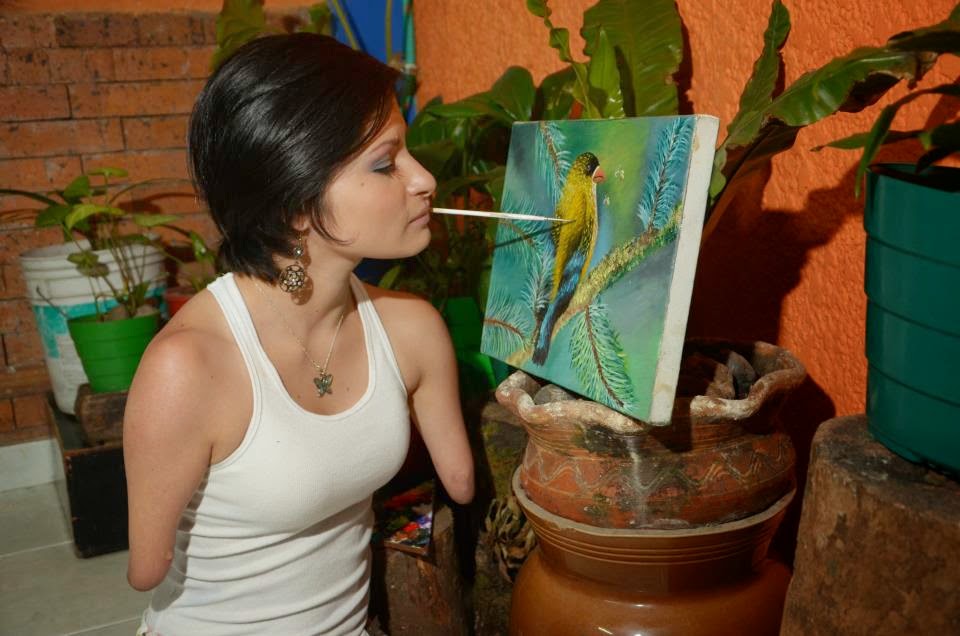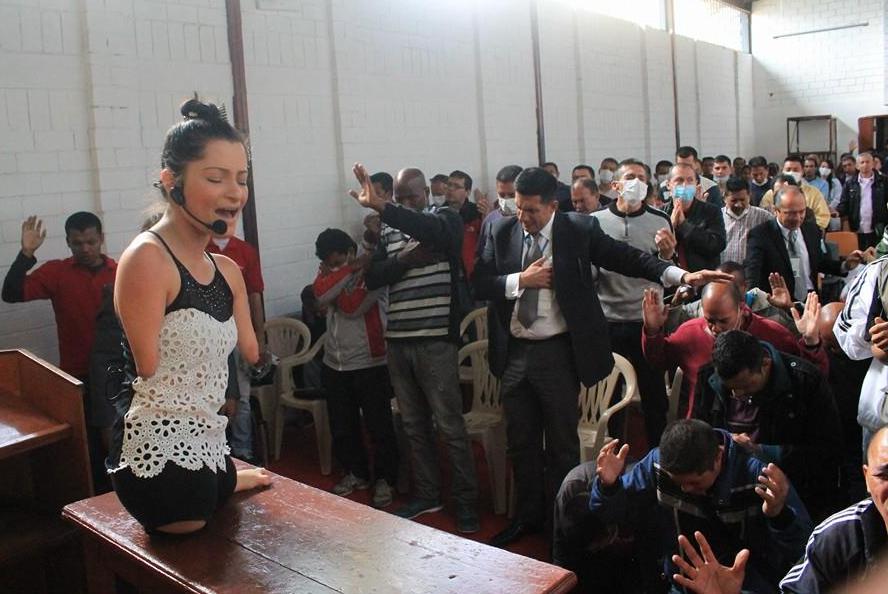
Our guest this month on People Extraordinaire is – Zuly Sanguino. Born with Tetra-amelia syndrome, an extremely rare autosomal recessive congenital disorder characterized by the absence of all four limbs, it has been a difficult life for Zuly Sanguino, a 26 year-old Colombian artist and motivational speaker. Subjected to bullying and sexual abuse from a very young age, Zuly made several suicide attempts. After hitting rock bottom at age 15, Zuly slowly started to rebuild her confidence and her life, with the help of her mother Guillermina and her siblings. Zuly turned into a motivational speaker and inspires thousands with her passion for art and life at hospitals, churches, businesses, prisons and schools.
You were born with a rare genetic condition – Tetra amelia syndrome, as a result your limbs did not develop properly. When was the first time you realized you were different from others? Any incident from childhood that sticks out?
I grew up in Colombia in a family where nobody would let me know that I had a disability. I was just like another child for my mom. In our house, everybody treated me the same and I was lucky to be in that environment. I never realized that I was different, that I didn’t have limbs until I was 5 or 6 years old and started going to school. Kids at school looked at me differently, and treated me differently, even the teachers. In some ways, it started with the bullying, because I was different. Then I realized, “Oh my God, I don’t have limbs. I am different”.

I grew up in Colombia in a family where nobody would let me know that I had a disability. I was just like another child for my mom. In our house, everybody treated me the same and I was lucky to be in that environment. I never realized that I was different, that I didn’t have limbs until I was 5 or 6 years old and started going to school. Kids at school looked at me differently, and treated me differently, even the teachers. In some ways, it started with the bullying, because I was different. Then I realized, “Oh my God, I don’t have limbs. I am different”.
At home we are six siblings, three girls, two boys and myself. I don’t feel any different, my brothers and sisters always treat me like a normal person and have never made me feel that I did not have limbs. I always feel loved and connect well with my brothers and sisters. They have never said, “you are different, you don’t have limbs”.
You were raped as a teenager, bullied in school and have even attempted suicide. You really hit rock bottom by age 15, what or who helped you come out of that dark phase and what gave you hope?
I was sexually abused and bullied since I was 5 years old. All these bad events in my life were too much for me to handle. I was really young and I didn’t know what to do. I had hit rock bottom and that’s when I attempted suicide. God and my family, especially my mom, saved me and helped me recover. She was always there for me. She really helped me believe in myself and see that I was valued. By the age of 15, I realized that my story could help other people. It renewed my self-belief. I started to share my story and openly talk about it with people. Many disabled people drew inspiration from me and told me that my story helped them in many ways. This ability to make a difference in someone’s life, helped me connect better with myself and others. I realized that I have a mission and that mission was to help others through my story.

You are now a great painter who not only sells her paintings but also teaches people to paint with their mouth. How did you get into painting and why?
I grew up in an artistic environment because my whole family does art. My brothers, my sisters, my mom, everybody has shown this talent in different ways. So, it was easy for me to learn because everybody was doing it. I was 4 years old when I started thinking about art. I started using the brush with my mouth and my mom guided me. Initially I used art to express my sadness. I was sad because my father had committed suicide, I was bullied and raped. I used art to escape. I never thought that I could paint something beautiful like flowers or nature to show happiness.

Describe a day in the life of Zuly. What are some challenges you still face in your daily life? How do you overcome them?
I do things like any normal girl would do every day, but of course a little differently. I love to take care of myself. I don’t let the fact that I don’t have limbs get to me. I am happy with what I have. I like to put on makeup, fix the house and help with household chores. I like going outside and doing social work, I visit churches, hospitals, talk to kids who are sick and try to give them hope. I talk to girls who have been attacked with acid; in Colombia it happens a lot. There are a lot of problems that I can talk about and motivate people to make a change. There is a lot of work I can do. I can go out and take part in environmental care, teach kids art and how to paint with their mouth and counsel them not to do drugs.
Colombia is a really poor country where people do not have many opportunities. They do not have any support from the government. When you are poor, and have a disability, you are on your own. We don’t have therapy or physiotherapy where families can learn how to live with that disability or learn how to move around the house or learn to be self-sufficient. My mom taught me to brush my teeth and brush my hair. It was a learning process for the whole family. No one in the house had any prior experience with disability. It was really hard for my mother too, because she had to look after six kids and one of them was disabled. She had to work because she didn’t have any support from the government, she didn’t have any money. We were living in a room with seven other people. Unfortunately, she couldn’t be there for me all the time. She tried hard but there were days when she left the house early in the morning and came home late at night. She had no choice but to leave the kids alone sometimes, unprotected with people who could do bad things. That’s why the rape happened.
The biggest challenge I have now is moving around the city. Colombia is not as developed as the United States where you can grab a car and put a wheelchair in it. The United States has sidewalks and other facilities for disabled people. In Colombia, there is no respect for disabled people. People often park their cars in disabled parking spots. I don’t have a car so everybody has to grab me and put me in different places. When I am traveling by bus, I have to ask somebody to grab me and it doesn’t feel natural. I am not a baby and there is no dignity in it. I am trying to change this culture of indifference in Columbia. I am talking with people, trying to make them understand that disability doesn’t make us less human.
Describe a day in the life of Zuly. What are some challenges you still face in your daily life? How do you overcome them?
It’s normal to sometimes feel nervous and when that happens, I try to focus on the message that could potentially change lives. And when I start thinking like that, nothing gets in the way. The most important thing for me is to trust myself and believe in myself. The minute I am able to make people believe that despite all odds there is hope, I feel super happy.
My message to everyone is “Start believing in yourself. Once you start believing in yourself you are capable of doing amazing things in your life. If I can do it, you can do it!” People with limbs, people with no limbs, anybody with any disability, can do it. You have to put this in your mind and in your soul. It is hard, but not impossible. That is what I am trying to let people know. It was hard for me. But I pushed myself, set goals for myself and told myself, “I am going to make it happen”, and I did it. Imagine just one day without limbs, and try to do the things I have done. It is hard, but not impossible. This is what I am trying to make people believe.

-
In the future, Zuly hopes to take her take her motivational talks beyond Colombia to America and beyond
You are an amazing motivational speaker. Do you get nervous before a talk? What advice would you give to disabled people?
It’s normal to sometimes feel nervous and when that happens, I try to focus on the message that could potentially change lives. And when I start thinking like that, nothing gets in the way. The most important thing for me is to trust myself and believe in myself. The minute I am able to make people believe that despite all odds there is hope, I feel super happy.
My message to everyone is “Start believing in yourself. Once you start believing in yourself you are capable of doing amazing things in your life. If I can do it, you can do it!” People with limbs, people with no limbs, anybody with any disability, can do it. You have to put this in your mind and in your soul. It is hard, but not impossible. That is what I am trying to let people know. It was hard for me. But I pushed myself, set goals for myself and told myself, “I am going to make it happen”, and I did it. Imagine just one day without limbs, and try to do the things I have done. It is hard, but not impossible. This is what I am trying to make people believe.
How do you keep yourself motivated and positive?
I love nature, I love animals, I connect with everything. I seek life and all this amazing energy we call love. It is everywhere. When you start thinking like that, you start to be a happy person. I feel good about myself and am happy with the way I am. This positive way of thinking gives me happiness and keeps me going. I believe in my family and in the good things I have in life. Valuing the things that you do have in your life is going to make you a happy person.
Are there any dreams or goals that you have for yourself?
I have many dreams but the one that is most important to me is to bring hope to a lot of people around the world who are suffering. I want to bring hope and show them that if you believe in yourself you can do it. It’s your choice to live in sadness or not. I want to be the voice of a lot of people who don’t have a voice, especially the disabled who don’t have a quality of life because of lack of government support. Many don’t have wheelchairs and others have to stay at home because of lack of access to streets and sidewalks. I want to fight for all of them. This is important to me.
If you could change one thing in your life what would that be?
I wouldn’t change anything. If I had to choose again to be born without limbs, I’m going to pick this life again because that is who I am. That is what makes me the powerful person that I am. If I had limbs, I wouldn’t be the person that I am now. So, I wouldn’t change anything.
What is your idea of an empowered woman?
For me everybody has the power to be a source of inspiration. They just have to find it for themselves. I try to learn and appreciate the beauty in each person. If we start learning about each other, we start to be the person we want to be. I see beauty everywhere; it doesn’t matter how the society looks at you. It doesn’t matter if you are small, big or fat, we are all beautiful in our own way.
Sayfty’s mission is to educate, equip and empower women to protect her against violence. What’s your message for our readers related to women’s personal safety and the issue of violence against women?
My message to all the women out there is “The most important thing is to start believing in yourself. Start seeing that you are amazing human beings. When you are having problems, learn to speak up! Talk to the police or someone you trust, because a lot of people are afraid to talk and they allow their husbands, boyfriends, or partners to abuse them. You need to start believing that you deserve a better life”. I suffered from bullying, I was abused both psychologically and physically. One of the ways to get out of that feeling of worthlessness was by believing in myself. Believing that I was important; that nobody deserved to be treated in that way.
Bio
Born with Tetra-amelia syndrome, an extremely rare autosomal recessive congenital disorder characterized by the absence of all four limbs, it has been a difficult life for Zuly Sanguino, a 26 year-old Colombian artist and motivational speaker.
Subjected to bullying and sexual abuse from a very young age, Zuly made several suicide attempts. After hitting rock bottom at age 15, Zuly slowly started to rebuild her confidence and her life, with the help of her mother Guillermina and her siblings. Zuly realized she had so much to live for and that she had spent too long letting her disability get her down. Zuly turned into a motivational speaker and inspires thousands with her passion for art and life at hospitals, churches, businesses, prisons and schools. Her first talk about bullying was in front of 400 college students and parents.
She spends her time in many positives ways, inspiring children and young people in poor neighborhoods and teaching them to paint with their mouths. She promotes environmental care, emphasizing the importance of recycling and keeping parks and public spaces clean. She spends her time visiting children’s hospitals and brings her message of love, courage and hope to kids suffering from enduring/terminal illnesses.
Zuly has become a voice for people with disabilities in Colombia and South America. She featured in a National Geographic Channel documentary, where she talked about the importance of building cities with facilities for people with disabilities, as most people with disabilities stay home feeling sorry and miserable for themselves.
Zuly talks to women who have been victims of acid attacks in Colombia and abused in many different ways, encouraging them to rebuild their lost confidence. She works with the government of Colombia giving motivational speeches to young army soldiers who lost limbs in the Colombian war against drugs and guerrillas. Zuly loves nature and animals, and is an advocate of protecting their rights and habitats.
Zuly Sanguino’s dream is to take her inspirational life around the world helping people, showing them that if she can do it, they can do it!!! Her voice has started to spread around the world through documentaries, interviews and articles by major media companies like Barcroft TV, National Geographic, Daily Mail UK, Mirror UK, New York Post and Insider among many others. Her story has now been written in more than 30 languages around the world.
